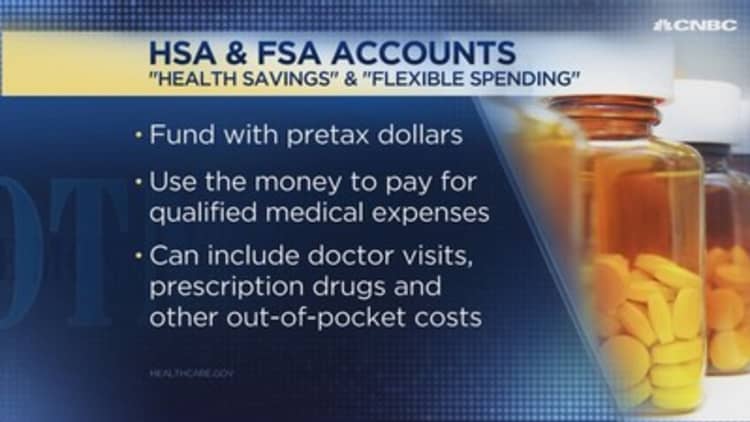Some of the cash you've been accumulating all year is about to disappear for good.
Health-care flexible spending accounts, or FSAs, are tax-advantaged accounts you may be able to find at work. You can save pretax dollars in these accounts and then use your money tax-free to pay for qualified medical costs.
You can't hold onto your savings forever, however. Generally, workers who contributed to these accounts in 2019 have until the end of the year to use their proceeds.
"Some people have a hard stop on Dec. 31 and must spend now or risk losing the money," said Rachel Rouleau, director of compliance at the FSA Store. "It's an important time of year for people to be aware of the money they have in their accounts."

The IRS gives employers the option of allowing workers to roll over $500 into the following year or giving them up to March 15 of the new year to use the money. Companies aren't required to give you either choice.
Workers forfeit as much as $400 million each year in unused account cash, FSAStore.com found.
"Start by finding out whether your employer requires you to use the money up now, or do they give you a grace period or allow you to carry forward the money," said Brian Ellenbecker, senior financial planner at Robert W. Baird & Co. in Milwaukee.
Money you lose to the plan is used to cover its expenses, said Kristen Appleman, vice president of health and wealth at ADP TotalSource.
Contribution limits
In 2019, you were able to stash $2,700 in a health-care FSA. Next year, that goes up to $2,750.
These accounts are different from other tax-advantaged benefits you'll find at work.
For instance, dependent care FSAs, which you can use to cover child-care costs for kids under 13, allow you to save up to $5,000 a year on a pretax basis. These funds must also be used by the end of the year.
Health-care FSAs are also different from health savings accounts. So-called HSAs are also funded on a pretax basis, and you can use the money tax-free for medical costs.
See below for a comparison of the two accounts from Napkin Finance, an upcoming personal finance book.
The key difference is that you can continue to save your HSA balance from one year to the next. You can even invest the funds and use them for health-care expenses in retirement. They generally are paired with high-deductible health plans.
Meanwhile, you don't need a high-deductible plan to save in an FSA.
Not just bandages
Rather than just snatching up boxes of bandages and prescription cough syrup, think about the best way to use your leftover cash.
"We encourage people to think about eye care, so make an appointment for an eye exam and get your contacts and glasses," Ellenbecker said. "Fill out all of your prescriptions prior to year-end."
If you've been holding off on elective but eligible medical procedures and services, now might be the time to get the work done.
More from Personal Finance:
Millennial investors in California are heading to 3 tax havens
Four steps to build an emergency fund
The average worker at this company gets a $50,000 bonus
This would include laser-eye surgery, weight-loss programs – provided your doctor diagnosed a need — and smoking cessation programs, said Appleman.
Whether it's a dreaded root canal or your kid's new braces, dental work is also FSA-eligible.
Finally, you can also use your FSA balance for some self-care under the right circumstances.
Massage therapy, acupuncture and chiropractic work are all eligible expenses. Just be aware that you'll need your doctor to provide you with a letter of medical necessity, indicating that these therapies are necessary for treating a condition.


